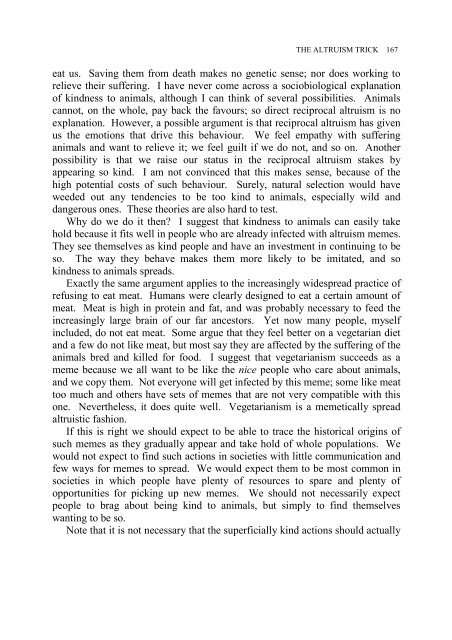The Meme Machine
TheMemeMachine1999
TheMemeMachine1999
- No tags were found...
You also want an ePaper? Increase the reach of your titles
YUMPU automatically turns print PDFs into web optimized ePapers that Google loves.
THE ALTRUISM TRICK 167<br />
eat us. Saving them from death makes no genetic sense; nor does working to<br />
relieve their suffering. I have never come across a sociobiological explanation<br />
of kindness to animals, although I can think of several possibilities. Animals<br />
cannot, on the whole, pay back the favours; so direct reciprocal altruism is no<br />
explanation. However, a possible argument is that reciprocal altruism has given<br />
us the emotions that drive this behaviour. We feel empathy with suffering<br />
animals and want to relieve it; we feel guilt if we do not, and so on. Another<br />
possibility is that we raise our status in the reciprocal altruism stakes by<br />
appearing so kind. I am not convinced that this makes sense, because of the<br />
high potential costs of such behaviour. Surely, natural selection would have<br />
weeded out any tendencies to be too kind to animals, especially wild and<br />
dangerous ones. <strong>The</strong>se theories are also hard to test.<br />
Why do we do it then? I suggest that kindness to animals can easily take<br />
hold because it fits well in people who are already infected with altruism memes.<br />
<strong>The</strong>y see themselves as kind people and have an investment in continuing to be<br />
so. <strong>The</strong> way they behave makes them more likely to be imitated, and so<br />
kindness to animals spreads.<br />
Exactly the same argument applies to the increasingly widespread practice of<br />
refusing to eat meat. Humans were clearly designed to eat a certain amount of<br />
meat. Meat is high in protein and fat, and was probably necessary to feed the<br />
increasingly large brain of our far ancestors. Yet now many people, myself<br />
included, do not eat meat. Some argue that they feel better on a vegetarian diet<br />
and a few do not like meat, but most say they are affected by the suffering of the<br />
animals bred and killed for food. I suggest that vegetarianism succeeds as a<br />
meme because we all want to be like the nice people who care about animals,<br />
and we copy them. Not everyone will get infected by this meme; some like meat<br />
too much and others have sets of memes that are not very compatible with this<br />
one. Nevertheless, it does quite well. Vegetarianism is a memetically spread<br />
altruistic fashion.<br />
If this is right we should expect to be able to trace the historical origins of<br />
such memes as they gradually appear and take hold of whole populations. We<br />
would not expect to find such actions in societies with little communication and<br />
few ways for memes to spread. We would expect them to be most common in<br />
societies in which people have plenty of resources to spare and plenty of<br />
opportunities for picking up new memes. We should not necessarily expect<br />
people to brag about being kind to animals, but simply to find themselves<br />
wanting to be so.<br />
Note that it is not necessary that the superficially kind actions should actually



